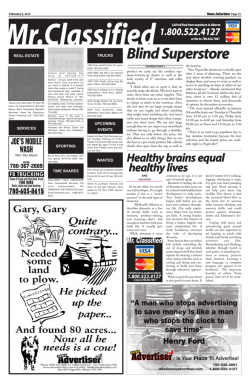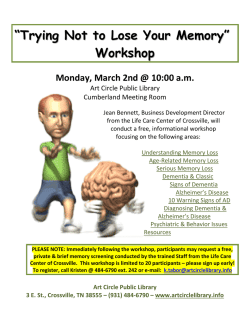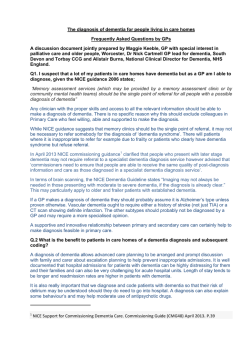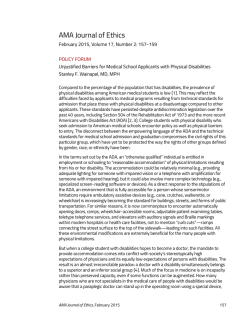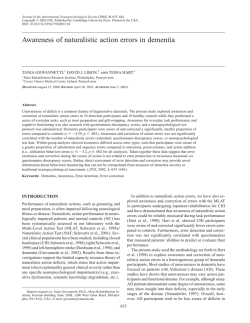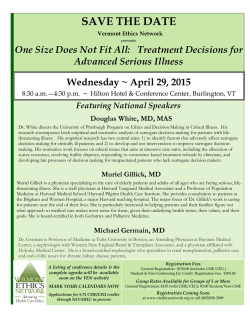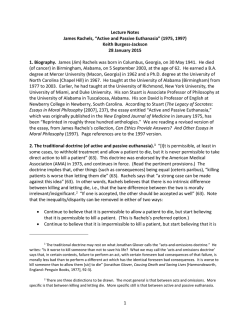
Provisional PDF - BioMed Central
BMC Medical Ethics This Provisional PDF corresponds to the article as it appeared upon acceptance. Fully formatted PDF and full text (HTML) versions will be made available soon. Opinions about euthanasia and advanced dementia: a qualitative study among Dutch physicians and members of the general public BMC Medical Ethics 2015, 16:7 doi:10.1186/1472-6939-16-7 Pauline SC Kouwenhoven ([email protected]) Natasja JH Raijmakers ([email protected]) Johannes JM van Delden ([email protected]) Judith AC Rietjens ([email protected]) Donald G van Tol ([email protected]) Suzanne van de Vathorst ([email protected]) Nienke de Graeff ([email protected]) Heleen AM Weyers ([email protected]) Agnes van der Heide ([email protected]) Ghislaine JMW van Thiel ([email protected]) ISSN Article type 1472-6939 Research article Submission date 22 March 2014 Acceptance date 2 January 2015 Publication date 28 January 2015 Article URL http://www.biomedcentral.com/1472-6939/16/7 Like all articles in BMC journals, this peer-reviewed article can be downloaded, printed and distributed freely for any purposes (see copyright notice below). Articles in BMC journals are listed in PubMed and archived at PubMed Central. For information about publishing your research in BMC journals or any BioMed Central journal, go to http://www.biomedcentral.com/info/authors/ © 2015 Kouwenhoven et al. This is an Open Access article distributed under the terms of the Creative Commons Attribution License (http://creativecommons.org/licenses/by/4.0), which permits unrestricted use, distribution, and reproduction in any medium, provided the original work is properly credited. The Creative Commons Public Domain Dedication waiver (http://creativecommons.org/publicdomain/zero/1.0/) applies to the data made available in this article, unless otherwise stated. 1 Opinions about euthanasia and advanced dementia: a qualitative study 2 among Dutch physicians and members of the general public 3 Pauline SC Kouwenhoven 1 [email protected] 4 Natasja JH Raijmakers 2 [email protected] 5 Johannes JM van Delden 1 [email protected] 6 Judith AC Rietjens 2 [email protected] 7 Donald G van Tol 3 [email protected] 8 Suzanne van de Vathorst 4 [email protected] 9 Nienke de Graeff 1 [email protected] 10 Heleen AM Weyers 5 [email protected] 11 Agnes van der Heide2 [email protected] 12 Ghislaine JMW van Thiel1 [email protected] 13 14 Author affiliations 15 1 Julius Center for Health Sciences and Primary Care, University Medical Center Utrecht, 16 the Netherlands 17 2 Department of Public Health, Erasmus Medical Center Rotterdam, The Netherlands 18 3Department of General Practice, University Medical Center Groningen, The Netherlands 19 4 Department of Ethics and Philosophy of Medicine, Erasmus Medical Center Rotterdam, 20 The Netherlands 21 5 Department of Legal Theory, University of Groningen, Groningen, The Netherlands 22 23 Corresponding Author 24 Ghislaine van Thiel 25 Julius Center for Health Sciences and Primary Care | University Medical Center Utrecht 1 1 Room number STR.5.133 | P.O. Box 85500 | 3508 GA UTRECHT | the Netherlands | 2 Internal post number STR.6.131 3 T +31 (0)88 75 54319 | email: [email protected] | www.umcutrecht.nl 4 5 Word count Abstract: 214 Manuscript: 2279 6 7 8 Abstract 9 Background 10 The Dutch law states that a physician may perform euthanasia according to a written 11 advance euthanasia directive (AED) when a patient is incompetent as long as all legal 12 criteria of due care are met. This may also hold for patients with advanced dementia. We 13 investigated the differing opinions of physicians and members of the general public on 14 the acceptability of euthanasia in patients with advanced dementia. 15 Methods 16 In this qualitative study, 16 medical specialists, 19 general practitioners, 16 elderly 17 physicians and 16 members of the general public were interviewed and asked for their 18 opions about a vignette on euthanasia based on an AED in a patient with advanced 19 dementia. 20 Results 21 Members of the general public perceived advanced dementia as a debilitating and 22 degrading disease. Physicians emphasized the need for direct communication with the 2 1 patient when making decisions about euthanasia. Respondent from both groups 2 acknowledged difficulties in the assessment of patients’ autonomous wishes and the 3 unbearableness of their suffering. 4 Conclusion 5 Legally, an AED may replace direct communication with patients about their request for 6 euthanasia. In practice, physicians are reluctant to forego adequate verbal 7 communication with the patient because they wish to verify the voluntariness of patients’ 8 request and the unbearableness of suffering. For this reason, the applicability of AEDs in 9 advanced dementia seems limited. 10 11 12 Key words euthanasia, dementia, end-of-life decisions, public opinion, ethics, law 13 14 Background 15 Euthanasia and physician-assisted suicide are permitted by law in the Netherlands, if 16 performed by a physician who meets the six criteria of due care (Box 1) and reported to 17 one of the review committees. Dutch law states that a physician may act according to an 18 advance euthanasia directive (AED) when the patient is incompetent as long as all 19 criteria of due care are met. In this way, the law provides a legal possibility for euthanasia 20 in patients with advanced dementia based on an AED. In 2011, the first publicly known 21 case of euthanasia in a patient with advanced dementia was reported and assessed by a 22 review committee. The review committee judged – after extensive deliberation and 3 1 consultation - that in this case, the due care criteria were met. However, the Royal Dutch 2 Medical Association issued guidelines in 2010 and 2012 stating that the possibility of 3 direct communication with the patient is indispensable in order to meet the criteria of due 4 care. [1] [2] Therefore, it remains a topic of debate in the Netherlands whether 5 euthanasia in patients with advanced dementia is acceptable. [3] In our study on 6 Knowledge and Opinions of the Public and Professionals regarding End of Life decisions 7 (the KOPPEL study), we found that patients and citizens have more permissive attitudes 8 towards euthanasia in patients with advanced dementia than physicians. The KOPPEL 9 study was published earlier.[4]However, the qualitative interview data regarding 10 euthanasia in advanced dementia were not presented. The reasons behind the differing 11 views on this issue thus remained unclear. Therefore, we analyzed the interview data 12 from the KOPPEL study, guided by the following research question: What are the 13 opinions of physicians and members of the general public in the Netherlands on 14 euthanasia in patients with advanced dementia? We analysed the opinions of the 15 respondents with the aim to clarify the divergence between physicians and the general 16 public. 17 18 19 Methods 20 Design and population 21 This study is part of the KOPPEL-study: Knowledge and Opinions of the Public and 22 Professionals regarding End of Life decisions. The KOPPEL study is a mixed method 23 study: quantitative methods were used to collect data on knowledge and opinions about 24 euthanasia among the Dutch general public, physicians and nurses. To gain more in- 4 1 depth information about the views of these groups, we performed qualitative interviews 2 among selected respondents. [4] 3 We used purposive sampling to select candidates [5] with the aim to maximize the range 4 of different opinions and experiences. Furthermore, we strived for a balanced distribution 5 of age, education and gender. We selected 125 respondents in total. We continued 6 enrolling subjects for interviews in each group until conceptual saturation per group was 7 achieved. Methods are described in more detail in a previous publication. 8 9 Data collection 10 Four researchers (PK, NR, DvT, and HW) and two medical students conducted the 11 interviews. The one-hour interviews were semi-structured with use of an interview 12 guideline with open questions and topics. Most interviews with physicians were 13 conducted at their working place and with members of the general public in their homes. 14 A random sample of respondents was presented with the following vignette about a 15 patient with advanced dementia with an AED containing a request for euthanasia that 16 was eventually granted by his physician. 17 Mr Smit is 62 years old and suffering from dementia. He doesn't recognise his wife and children anymore, refuses to eat and withdrawals into himself more and more. It is no longer possible to communicate with him about his treatment. Shortly before he became demented, he drafted an advance directive with a euthanasia request in case of dementia. His family agrees. The physician decides to honour his patient’s advance directive and 5 performs euthanasia. 1 2 Respondents were asked two questions about the vignette: “Is the physician’s act legal in 3 the Netherlands?” and “Do you personally agree with the physician’s act?” 4 5 Analysis 6 All interviews have been transcribed verbatim and were analysed with content analysis 7 using Atlas.ti version 6.1.1. A uniform code tree was developed and agreed upon by all 8 researchers. The interview parts including the vignettes were analysed in more detail by 9 two researchers independently (PK and NR). Themes and coding were discussed until 10 consensus was reached in all cases. The findings were later discussed with other 11 members of the group (HD, AH, JR, GT). 12 13 Ethics approval and informed consent 14 Regarding ethical approval, according to the Dutch Medical Research Involving Human 15 Subjects Act, this kind of observational study is exempt from ethical review. 16 Respondents were selected from the participants of the KOPPEL study, who voluntarily 17 provided us with their personal contact details. Before the start of the interview, the 18 voluntary character and confidentiality of participation were emphasized. Study 19 participants were informed about the aims, content, procedure and publication of the 20 study. Participants provided oral informed consent to participation in the study. Interviews 21 were recorded after obtaining the permission of the interviewee. 22 6 1 Results 2 3 Respondents’ characteristics 4 All interviewees were asked about their opinions about the vignette on euthanasia in a 5 patient with advanced dementia. Saturation in the KOPPEL-interview study was reached 6 after conducting 67 interviews: 16 with medical specialists, 19 with general practitioners, 7 16 with elderly care physicians and16 with members of the general public. In addition, 18 8 nurses were interviewed, but the results are not presented here. See table 1 for 9 interviewees’ characteristics. 10 Many physicians emphasized that they consider euthanasia in advanced dementia 11 problematic, both legally and personally. They doubted if the criteria of due care can be 12 met in this situation. Specifically mentioned was the complicated assessment of whether 13 the criteria concerning unbearable suffering without prospect of relief and the 14 voluntariness of the request are met. Almost all physicians mentioned the need for 15 explicit confirmation of the euthanasia request by the patient at the time of decision 16 making as well as confirmation of the unbearableness of suffering. They explained that 17 such communication is generally impossible in patients with advanced dementia. Some 18 physicians emphasized the importance of high quality supportive care at the end of life 19 and that euthanasia should not be viewed as a substitute for good care. Several 20 physicians said that they feel that the general public is not well informed about the 21 limitations of the law in case of late stage dementia. Some physicians stated that 22 euthanasia in advanced dementia should be possible, even if they (incorrectly) thought 23 this is not legally allowed in the Netherlands. (see Box 2) 7 1 Several members of the general public described a negative image of advanced 2 dementia: they mentioned suffering they had personally witnessed in friends or relatives 3 with dementia and many of these interviewees called these situations humiliating. Some 4 members of the general public mentioned the absence of a prospect of relief of suffering 5 due to dementia as an argument in favor of euthanasia in case of advanced dementia. 6 Other respondents mentioned that they thought the suffering was absent or doubtful in 7 encounters with their friends or relatives with advanced dementia. Some respondents 8 claimed that the request of a formerly competent person should be respected and that 9 patients with advanced dementia should be able to get euthanasia if they so desire (see 10 Box 2). 11 Both physicians and members of general public recognized the importance of respecting 12 a competent wish as laid down in an AED. However, both also mentioned possible 13 problems and limitations regarding a formerly written request: foreseeing future wishes 14 and suffering was regarded as difficult, because people may change their preferences 15 and adapt to new situations they previously thought to be unbearable. Furthermore, they 16 questioned if suffering is unbearable in patients with advanced dementia or mentioned 17 that especially the relatives suffer. Both groups perceived the quality of care in some 18 nursing homes as inferior and pleaded for better care for patients with dementia. Other 19 issues they mentioned were the unfinished societal debate about euthanasia and the 20 problem of the growing prevalence of dementia. Respondents of both groups said they 21 would prefer using the AED as a non-treatment directive instead of an euthanasia 22 directive. They also stated that performing euthanasia in a patient with advanced 23 dementia would be burdensome for the physician. 24 25 8 1 Discussion 2 Earlier research showed a majority of members of the general public personally agree 3 with euthanasia on the basis of an AED in case of advanced dementia, whereas only a 4 minority of physicians does. [6] [7] [4] In our interviews, both physicians and members of 5 the general public acknowledge difficulties in the assessment of the voluntariness of the 6 request and the extent of suffering of patients with advanced dementia. Physicians 7 regard direct communication with the patient as essential for this assessment. Obviously, 8 this is compromised in patients with advanced dementia. 9 No less than 67 interviews were conducted and the method of purposive sampling 10 guaranteed a wide range of opinions. Questions were highly comparable between all 11 groups of respondents, ensuring the validity of the comparison. Furthermore, the use of 12 vignettes in decision-making research has shown its value. [8] 13 14 Respondents were not fully representative of the Dutch population; the sample was 15 slightly older, more often male, higher educated and more often shared a household. 16 Migrants also were underrepresented. For all groups, possible selection bias should be 17 taken into account. It could be that people with more experience and affinity with the 18 discussion about euthanasia were more likely to participate in this study. 19 20 Previous research hypothesized that communication with the patient is important for 21 physicians and that euthanasia therefore will be only rarely performed in patients with 22 advanced dementia. [1] [9] [10] [11] Our in-depth interview study confirms this 23 hypothesis. The criteria of due care regarding voluntariness and unbearable suffering 24 make communication of key importance for doctors in the decision-making process. 25 Unbearable suffering and a voluntary euthanasia request of a patient are apparently 9 1 criteria that should be jointly fulfilled for physicians to experience a moral appeal that is 2 strong enough to be willing to perform euthanasia. By communicating personally with the 3 patient in one or more conversations, the physician acquires a comprehensive 4 understanding of the patient’s suffering and his or her wish to die. This understanding 5 then moves the physician to become willing to perform euthanasia. An AED, however, 6 contains a request that was expressed in the past when the patient was still competent, 7 and provides no information about the patient’s actual suffering. In a patient with 8 advanced dementia, the physician thus needs to be moved literally and figuratively by his 9 own perception of the patients’ suffering combined with what is stated in the AED. Both 10 elements that construct a moral appeal on the physician are present in a rather indirect 11 way only. According to the interviews in this study, respondents from both groups 12 acknowledge the difficulty of assessing whether there is unbearable suffering in 13 advanced dementia. De Boer et al. found that 54% of elderly care physicians agreed with 14 the statement ‘It is impossible to determine whether an incompetent person experiences 15 his/her dementia as unbearable and hopeless suffering’ and 76% agreed with the 16 statement ‘It is impossible to determine at what moment an AED in dementia is to be 17 carried out’. [9] Livingston et al. underpinned this and found that people with Alzheimer’s 18 disease actually tend to rate their quality of life high, even though most outsiders would 19 classify their daily existence as undesirable. [12]. At the same time it is fair to say that 20 end-stage dementia patients probably have a less than optimal quality of life, in part 21 because of suboptimal care. [12] 22 Furthermore, physicians as well as members of the general public acknowledge the limits 23 of AEDs: at the time of writing such a document one does not know the future nor to what 24 extent one will be able to adjust to new situations. Previous research shows that even 25 patients with dementia adjust actively to their disease, using both emotion- and problem10 1 oriented strategies. [13] The previously anticipated experiences of patients with 2 advanced dementia may thus differ from their actual daily experiences, but the physician 3 is generally not able to discuss these potential changes with the patient. 4 In some cases suffering may be unambiguously present and understood by non-verbal 5 communication. However, the assessment of the unbearableness of that suffering, which 6 is a prerequisite for euthanasia, seems to remain an important challenge. 7 Without adequate conversation about the patients wishes and their experiences of 8 suffering, making decisions about another person’s death apparently goes beyond what 9 physicians think they can account for. 10 All respondents seem to be guided by the best interest of the patient. However, different 11 roles and responsibilities in the decision-making process and performance of euthanasia 12 are likely to play a role, as has been suggested before.[14] Performing euthanasia is 13 known to have a clear emotional impact on physicians [13] and this may at least partly 14 explain their reticence. When the patient is no longer capable of confirming his wish, the 15 burden may be weightier. Furthermore, fear of legal consequences, due to the 16 experienced difficulties in meeting the criteria of due care, may hold physicians back in 17 performing euthanasia in cases of late-dementia. 18 Earlier research showed a clear discrepancy between the general public and physicians 19 in their support for euthanasia in a patient with advanced dementia. However, our 20 interview study showed many similarities in terms of appreciating the difficulties in 21 assessing voluntariness and unbearable suffering. 22 23 11 1 Conclusion 2 Legally, an AED could replace direct communication with the patient when making 3 decisions about euthanasia. In practice, adequate verbal communication with the patient 4 appears to be essential for physicians. Performing euthanasia in a case where the 5 presence of unbearable suffering and voluntariness of the request cannot be directly 6 confirmed by the patient is a bridge too far for most of them. For this reason, the 7 applicability of AEDs in advanced dementia seems limited, which explains the very low 8 number of cases. Physicians and members of the general public acknowledge the same 9 difficulties but may have different expectations about the possibility of euthanasia in late 10 stage dementia. Respectful communication between all involved remains important for a 11 better understanding of the (im) possibilities of ending life in advanced dementia and for 12 the prevention of expectations that cannot be met. 13 14 15 Competing interests 16 The authors declare that they have no competing interests. 17 18 19 Author’s contributions 20 All authors except NG were involved in the conception and design of the KOPPEL-study 21 and this qualitative study as a part of it. 12 1 PK interviewed most physicians, carried out the analysis and interpretation of the data of 2 the physicians and drafted the manuscript. 3 NR interviewed most members of the general public, carried out the analysis and 4 interpretation of the data of the general public and critically revised the manuscript. 5 JD, JR, AH and GT made substantial contributions to the study’s conception and design 6 and to the interpretation of the data and they critically revised the manuscript. 7 DT and HW made substantial contributions to the collection, analysis and interpretation 8 of the data and revised the manuscript. 9 SV critically revised the manuscript. 10 NG participated in the analysis and interpretation of data and critically revised the 11 manuscript. 12 All authors read and approved the final manuscript. 13 14 Acknowledgements 15 The authors thank all respondents who participated in this study and the CentERdata of 16 the University of Tilburg. 17 The research is part of the KOPPEL study on Knowledge and Opinions of Public and 18 Professionals on End-of-Life decisions, which was supported by a grant from the Dutch 19 Ministry of Health, Welfare and Sports. The sponsor approved the study design, but was 20 not involved in the collection, analysis, or interpretation of data, or in the preparation of 21 the manuscript. 13 1 Box 1: Dutch criteria of due care for euthanasia and physician-assisted suicide 2 (Termination of Life on Request and Assisted Suicide Act, 2002) 1. The physician must be convinced that the patient’s request is voluntary and wellconsidered 2. The physician must be convinced that the patient’s suffering is unbearable and without prospect of relief 3. The patient must be informed about his/her situation and prospects 4. The physician and the patient together must be convinced that there is no reasonable alternative solution for the situation 5. At least one other independent physician must be consulted 6. The ending of life must be performed in a professionally careful way 14 1 Table 1: Background characteristics of interview respondents Physicians (n=49) N (%) Members of the general public (n=16) (%) N Age Mean ± SD 49 ± 9 54 ± 13 Gender Male Female 33 (67) 16 (33) 8 (50) 8 (50) n.a. n.a. 49 (100) 5 (31) 6 (38) 5 (31) Experience with euthanasia 3 request Yes No Unknown 38 (78) 10 (20) 1 (2) 4 (25) 12 (75) n.a. Experience with advance 4 directive Yes No Unknown 19 (39) 26 (53) 4 (8) 1 (6) 14 (88) 1 (6) Hospital care Home care Nursing home care Unknown Attitude towards euthanasia and physician-assisted suicide 16 (33) 19 (39) 14 (28) n.a. n.a. n.a. n.a. n.a. Liberal Intermediate Conservative Unknown 23 (47) 22 (45) 4 (8) 8 (50) 3 (19) 5 (31) n.a. Education Low Middle High 1 Care setting 2 2 1 3 4 5 6 Low = level 1-3 according to ISCED guidance (primary school, lower secondary general education, lower vocational education), middle= level 4 according to ISCED guidance (intermediate vocational or higher secondary general education), high= level 5-7 according to ISCED guidance (higher vocational education or university) 7 2 8 9 3 internal medicine (2), sugery (1), neurology (5), pulmonology (5), cardiology (3) Experience with a patient's (for physicians) or relative's (for members of the general public) actual request in the last 5 years 4 10 11 Experience with an incompetent patient's (for physicians) or relative's (for members of the general public) advance directive in the last 5 years, in a situation where a medical decision needed to be made 12 Box 2: Euthanasia in advanced dementia: Examples of interviewee responses 15 Unbearable suffering If you see elderly people who have gone downhill and behave like small children, you say, “I don’t want that”. So then there has to be the option that if you become like that, you can say, “Just give me a pill or an injection or whatever”. (member of the public) I find it very difficult to determine whether a patient with dementia suffers unbearably. I tried to find that out in my father’s case, but I never got an idea if he, and all the patients around him of course, if they are suffering? (member of the public) I see people and think: I don’t think you are suffering, the family is suffering and others around him, because the person goes downhill, but at that moment I can not assess if the patient is still suffering that much and if it is really unbearable. (general practitioner) Is psychological suffering also unbearable suffering? Is someone who has dementia, but doesn’t know that about himself, is he suffering unbearably? (medical specialist) Voluntary and well-considered request Because in my view, one should be able to decide deliberately that one’s decision still stands. That it hasn’t changed. And an elderly person with dementia cannot do this. (elderly care physician) I always explain, if someone is suffering from dementia, an advance euthanasia directive does not apply. The person cannot ask him- or herself for euthanasia anymore. I cannot kill anyone who does not, who maybe doesn’t want that anymore now. (elderly care physician) Communication So it is not as much the directive but rather that you have to be in touch with the patient and have to have that conversation about whether you indeed consider your life to be unbearable. (elderly care physician) Look, such a euthanasia directive exists, but that request must of course be repeated at the moment itself, otherwise you could come up with such a directive at any time and say, well, now it has to end. (elderly care physician) Societal factors There are situations known where they still have to get the people out of bed at twelve for lunch, they have no time, well then they lie, for example, the whole night in a diaper full of shit. You don’t want that kind of life and that there is nothing you can do. Well then you feel embarrassed right? (member of the public) There are people who are just lonely and never have any visitors. But the moment you accept that those people then should get euthanasia, then you’re at the wrong end of the process. Instead, you have to make sure that it [loneliness] doesn’t occur anymore. (general practitioner) Ethical considerations Some tendency will develop in the Netherlands saying that the lives of people with Alzheimer’s disease living in a nursing home don’t count anymore and that 16 a life like that is not meaningful anymore. And I’m against that. There is a noticable change of view on Alzheimer. And that is one of the reasons why I oppose to euthanasia in Alzheimer patients. Because a judgement will be made: this life is not meaningful anymore. (general practitioner) The physician’s role The role of the law If someone asks me „If I become demented then you really have to give me an injection or whatever“, well, then I can say „I’m sorry, but I’m reluctant to do that. I was taught to cure you and not to let you die, but let’s agree that if you will be in such a condition and you have dementia and suffer from a serious airway infection, then I will not let you live any longer.“ (elderly care physician) I think it is inconsistent, look, such an advance directive is legal, but the law also states that the physician has to be convinced of the hopelessness and unbearableness of the patient’s suffering. And if you can’t have a conversation about that, then you can’t get convinced and therefore can’t perform euthanasia. (elderly care physician) 1 2 3 4 5 6 7 8 9 10 11 12 13 14 15 16 17 References 17 1 2 3 4 5 6 7 8 9 10 11 12 13 14 15 16 17 18 19 20 21 22 23 24 25 26 27 28 29 30 31 32 33 34 1. KNMG. Richtlijn euthanasie bij een verlaagd bewustzijn. 2010 [14-05-2013]; Available from: http://knmg.artsennet.nl/Publicaties/KNMGpublicatie/Richtlijneuthanasie-bij-een-verlaagd-bewustzijn.htm. 2. KNMG. Tijdig spreken over het levenseinde. 2012 [14-05-2013]; Available from: http://knmg.artsennet.nl/Publicaties/KNMGpublicatie/Handreiking-Tijdig-spreken-overhet-levenseinde-2012.htm. 3. de Boer ME, Hertogh CM, Droes RM, Jonker C, Eefsting JA. Advance directives in dementia: issues of validity and effectiveness. Int Psychogeriatr. 2010 Mar;22(2):201-8. 4. Kouwenhoven PS, Raijmakers NJ, Delden JJ, Rietjens J, Schermer MH, van Thiel GJ, et al. Opinions of health care professionals and the public after eight years of euthanasia legislation in the Netherlands: A mixed method approach. Palliat Med. 2012 Jun 13. 5. Strauss AL, Corbin J. Basics of qualitative research: techniquesand procedures for developing grounded theory: Thousand Oaks, Sage; 1998. 6. Tomlinson E, Stott J. Assisted dying in dementia: a systematic review of the international literature on the attitudes of health professionals, patients, carers and the public, and the factors associated with these. Int J Geriatr Psychiatry. 2014 Jul 10. 7. Rietjens JA, van der Heide A, Onwuteaka-Philipsen BD, van der Maas PJ, van der Wal G. A comparison of attitudes towards end-of-life decisions: survey among the Dutch general public and physicians. Soc Sci Med. 2005 Oct;61(8):1723-32. 8. Vayda E, Mindell WR, Mueller CB, Yaffe B. Measuring surgical decision-making with hypothetical cases. Can Med Assoc J. 1982 Aug 15;127(4):287-90. 9. de Boer ME, Droes RM, Jonker C, Eefsting JA, Hertogh CM. Advance directives for euthanasia in dementia: do law-based opportunities lead to more euthanasia? Health Policy. 2010 Dec;98(2-3):256-62. 10. de Boer ME, Droes RM, Jonker C, Eefsting JA, Hertogh CM. Advance directives for euthanasia in dementia: how do they affect resident care in Dutch nursing homes? Experiences of physicians and relatives. J Am Geriatr Soc. 2011 Jun;59(6):989-96. 11. Rurup ML, Pasman HR, Onwuteaka-Philipsen BD. [Advance euthanasia directives in dementia rarely carried out. Qualitative study in physicians and patients]. Ned Tijdschr Geneeskd. 2010;154:A1273. 12. Livingston G, Cooper C, Woods J, Milne A, Katona C. Successful ageing in adversity: the LASER-AD longitudinal study. J Neurol Neurosurg Psychiatry. 2008 Jun;79(6):641-5. 13. van Marwijk H, Haverkate I, van Royen P, The AM. Impact of euthanasia on primary care physicians in the Netherlands. Palliat Med. 2007 Oct;21(7):609-14. 35 36 18 Additional files provided with this submission: Additional file 1: File 1 Questionnaire physicians.pdf, 142K http://www.biomedcentral.com/imedia/3169647051257211/supp1.pdf Additional file 2: File 3 Questionnaire general public.pdf, 56K http://www.biomedcentral.com/imedia/7288756061511142/supp2.pdf Additional file 3: File 4 Interviewguide.pdf, 46K http://www.biomedcentral.com/imedia/5953096271511142/supp3.pdf Additional file 4: Translation vignette and relevant questions_MS 3520812561248174., 13K http://www.biomedcentral.com/imedia/3053028081562835/supp4.docx
© Copyright 2026
